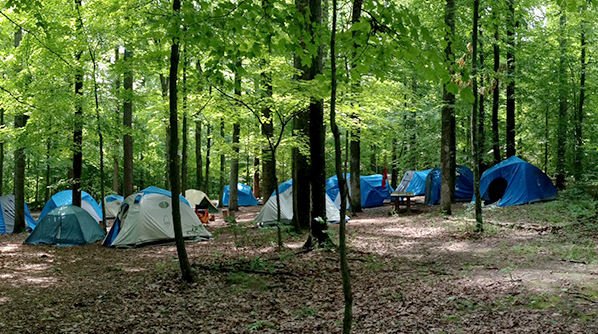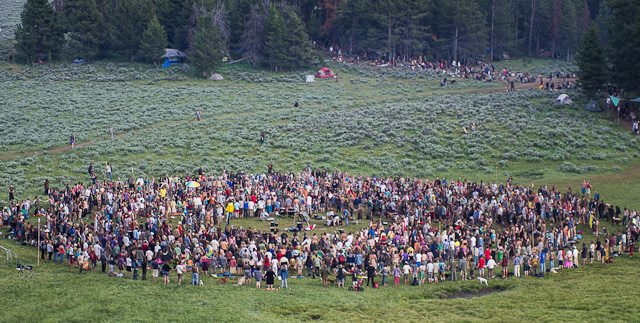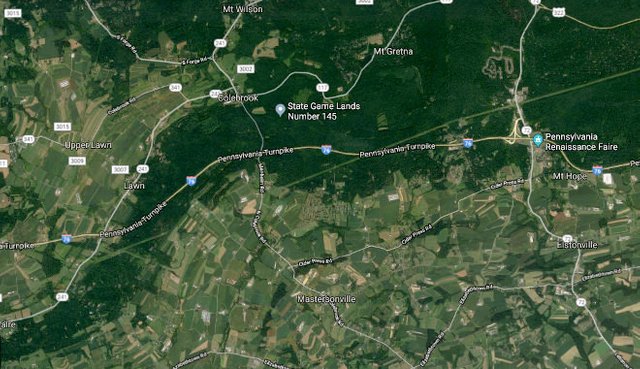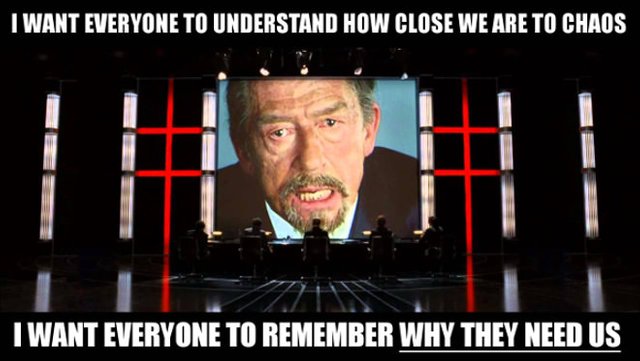A Matter of Scale

Imagine that you and five or six of your friends decide to go on a camping trip in the woods. What would your reaction be if one of those friends said the following?:
“It sounds nice, but who are we going to appoint to be in charge? I mean, someone who tells the rest of us how to behave, makes all the important choices and tells us what we can and can’t do, and punishes us if we disobey? Because without that—if we each just decide for ourselves what we’re going to do—obviously this camping trip will devolve into violent chaos!”
Would you consider such an opinion and suggestion reasonable, useful and necessary? Or would you find it bizarre, irrational and kind of creepy?

To put it another way, in the setting of you and a few friends, would you want authoritarianism, or would you want “anarchy” (no one ruling anyone else)? Incidentally, if everyone voluntarily decides to follow the advice of one person in the group—because maybe he knows more about camping, or maybe he knows the area really well—that’s not at all the same thing as appointing him as ruler, and telling him he gets to force his decisions on everyone else.
Now let’s suppose that, notwithstanding the weird suggestion of your one uber-statist friend, you all embark on this camping expedition anarchist-style, as a bunch of equals figuring things out along the way by consensus and agreement, instead of by coercion and domination.
After hiking for a while you encounter another group of people, about a dozen of them, out backpacking. You see the other group setting up tents for the night, and once again your anxious friend speaks up: “Now we definitely need to pick a leader, a ruler to speak on our behalf and represent us in our dealings with this group of strangers, otherwise they might kill and eat us, or enslave us!”

Now would you agree with him? Or would you still behave like an anarchist, not trying to rule anyone or be ruled by anyone, from either group?
Then suppose you go over and chat with that other group of campers, and they mention that there is some big camping event in the area, and there are many hundreds of campers around. Now your uber-statist friend urgently implores you to listen to him: “With all these people around, strangers whose histories and motives we don’t know, how can we afford to not appoint a master now!? Anything could happen if no one is in charge!”
You might then ask him if he really thinks that, even if your little group picked a leader from among you, hundreds of strangers would suddenly obey you. And he might respond, “Well, no, it can’t just be from our group; all the people together have to choose a ruler!”

It might then occur to you to ask, if he doesn’t trust that huge group of strangers to behave themselves, why would he trust them to appoint a ruler over everyone? Or, more specifically, if he is scared of an average stranger doing nasty things, why in the world would he trust an average stranger who has been given societal permission to dominate and control him (and everyone else)? At this point your paranoid friend is just about frothing at the mouth. “People acting on their own are unpredictable, careless, sometimes malicious and sadistic! We need LAWS to protect us!!! And we need LAW-MAKERS to write them!!”
Aren’t “law-makers” also just people? Aren’t they also sometimes unpredictable, careless, malicious and sadistic? In fact, aren’t politicians universally recognized as being less honest and more power-happy than the general public?
“WELL I DON’T TRUST PEOPLE AND I WANT SOME MAGIC SPELL TO MAKE EVERYONE BE NICE!!!”

Then you might have to tell your friend:
- As unpredictable or nasty as some people may be, there is no magic spell to make everyone be nice, or to always protect the good people from the bad people.
- Giving someone power over you isn’t going to make them less of a threat to you, and isn’t going to make them more honest or virtuous than they were before. (In fact, as the saying goes, “power corrupts.”)
- It’s just a bunch of people out camping. Chill out.
But then the question becomes, at what scale do you suddenly think that human interaction and peaceful coexistence requires, or is even helped by, giving some people permission to forcibly rule everyone else? How big does the crowd have to be before you think a coercive ruler is going to make things better? Mind you, organization and cooperation—which occur all over the place, every day, on a voluntary basis—are not the same as authoritarian power. In fact, true cooperation and violent domination are mutually exclusive.

So, when you’re finished chuckling at your mentally unstable, state-worshiping friend, make sure you don’t have a touch of the same psychosis he has. At what point, at what scale, do you start to repeat the absurd idea that peaceful coexistence requires coercive “government”? How many people, or how big an area, does it take before you start asking for politicians and their hired enforcers (tax collectors, police, soldiers, etc.) to extort and dominate everyone, including you, for the “common good”?
Around the world and throughout history, people in positions of “authority” have committed far more theft, assault, terrorism and murder than normal people, by a huge margin. To trust people more when they have the power to forcibly extort and control you is just plain stupid. Anyone who says that “government” and political “authority” are necessary for, or conducive to, civil society, is merely repeating blatantly absurd lies—lies taught to him by those who want to rule over others.

(Larken Rose is a speaker, author and activist, having advocated the principles of non-aggression, self-ownership and a stateless, voluntary society for over twenty years. Donations to help support his articles, videos and other projects can be made by PayPal to "[email protected]" or by Bitcoin to 13xVLRidonzTHeJCUPZDaFH6dar3UTx5js.)
Unlike most people (statists), I think the smaller the scale, the more workable hierarchy is (like in a family) but that as the group gets larger, decentralization works much better. Sharing, for example, works well in a family environment. EF Schumacher pointed out in "Small is Beautiful" that sharing requires a framework of love/caring/emotion to occur. One thing statists/socialists never seem to notice, though, is that sharing also assumes ownership, which is why even a small family isn't really all that socialist.
I was about to nitpick a bit, but then you did it at the end anyway. :) Very small groups, like families, can look almost "socialist" in their functioning, but they still aren't really. They're just very informal and generous with giving and sharing PROPERTY.
This is a good analogy if you take it a little farther. You're right that the notion is a camping dictator is absurd, but it is also clear that there is a need for the capacity to make collective decisions - where to set up camp, what group activities to engage in, and that there's a natural delineation between what the collective should decide and what individuals should decide.
Any group of people is going to need a system for deciding who gets to consume what resources, who gets to dump their waste where, etc, but it doesn't have to be a top-hierarchal notion of a state.
This is the distinction between government and governance. The former is arguably unnecessary, and usually oppressive. The latter is necessary if pursued conscientiously, liberating.
I think that's where public choice theory could come into play. It's a field of economics that studies how groups of people manage a commons without a governing body.
Insert mandatory Elinor Ostrom citation
👍
I'm not sure why you would call it "governance," but otherwise I agree. "Governance" is from the same root as "governing," which almost always means one person or group forcibly controlling another. Consensus and agreement are not that.
You can use whatever words you choose; there are other more apt words to be found. When I say "government" here, I'm referring to a state or particular ruler. When I say "governance", I'm referring to the system by which group behavior emerges, whether it be through voluntary or involuntary processes. In the analogy, you and your friends aren't just aimlessly wandering the forest. There is deliberation and coordination of behavior.
It's going to be a great day when force and violence isn't used by government, because there won't be any.
Agreed.
governance - because we need some kind of control, or there will be anarchy!
government = control of the mind.
governance = control, using force over others.
anarchy = the absence of rulers.
In the future, things will be decided by all whom it affects.
There will not be a formal structure, it will just happen because that is the proper thing to do.
It will probably happen by the thing that replaces google making sure that all residents, and common visitors are notified of a proposed change. And then a discussion/forum will take place.
To proceed without this process will result in a backlash that no one will want to face. Further, having happy neighbors is of paramount importance.
There will be no governance creating this far better outcome.
In face, governance always puts a stop to actual discussion. Ending up with those with power silencing their opposition.
That is not how I'm those words. See my other response.
Yes, I saw that. And I do not agree with your choice of how to use those words.
I do understand that government schooling has minced these words badly, and so they must be made proper, and defined such.
The words you are looking for are government and community.
Community is the system by which group behavior emerges.
It does not come about by someone (with "authority") shouting that this should be the way the group behaves. In fact, if such happens, it usually has the opposite effect.
i.e. "Don't commit suicide, call this number for help" - increases the rate of suicides wherever it is posted.
Wow @larkenrose, this is some good talk, good analogy too, but I can't agree completely you know, a thing as simple as a camping can be organized easily without a ruler or government, but when it comes to a complicated arrangement like a big state things end up more complex. A lot of organization and probably some authority is required to keep things straight.
I hate government, but I believe it is a somewhat necessary evil. We need government but I'll say a different type of government that we have now, which is a less centralized, a more democratic, and a more honest government. These are what we need. It might seem difficult or impossible to achieve but we really have to strive towards this.
@nevies
Go to the nearest supermarket. See how complex it all is, the level of organization and cooperation involved. Then see how many people are FORCED to do any of that. (Hint: none of them.) Giving some people the RIGHT TO RULE is not only completely unnecessary to complex organization and cooperation; it is also immoral and drastically destructive.
Love the analogy of a big camping event and societal structures. People do seem to believe that appointment of leaders, no matter how flawed, is better than thinking for themselves. Worse yet, it is not the cream that rises to the top. I could not help but think of Lord of the Flies as I read your post. Again, whip up some fear to gain control and power. The world will disagree with me, but I see religion having the same characteristics. Great thought provoking post, @larkenrose!
Groups can have leaders and followers can think for themselves. Your comment is superficial and dehumanizing.
I respect the fact that you disagree with me, @itsokaytoeatmayo. Our differences in opinion are what make diversity of thought such a beautiful thing. Have a great day!
It is an odd predicament.
Many times in a group of people there is often a leader who rises from within due to their trustworthiness, performance, dependability, selflessness, and so on and so forth. BUT having such a leader AND giving them such power can leave the group as a whole weaker should that leader perish.
There are moments when consent within a group is terribly difficult to achieve and ofter you need that "leadership" individual to make a decision that everyone goes along with BECAUSE of the trust that leader has earned.
Without that person the group may never agree on anything and become stagnant at best, dissolve at worst.
Great post. Thank you. Merry christmas!!!
"if he doesn’t trust that huge group of strangers to behave themselves, why would he trust them to appoint a ruler over everyone?"
This is a very, very, very good point!
Just came over from Sola. I like your article. I agree with your point of view however our old system trained people to function and to obey and it takes a lot of awareness and reprogramming to adapt to a selfresponsible and cooperative lifestyle. Most people are used to „rulers“ to think for them. As I mentioned before, communities such as Steemit can be a solution to learn win-win coexistence. Happy New Year!
Nice,I want to your friend. I ever vote you and you vote me.thangk you. :)
Excellent article. Resteemed!